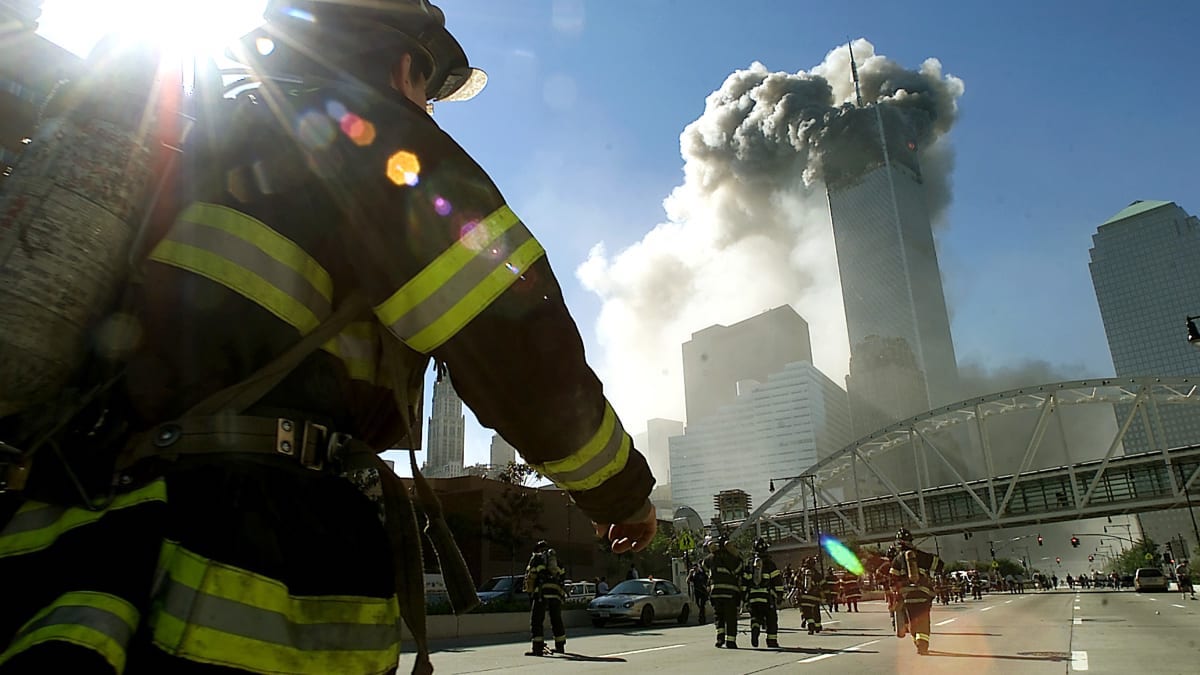Texts: Nehemiah 2.1-5, 13-18 and Philippians 2.1-13
This sermon originally preached on September 11, 2011
In the collective American psyche, September 11 is one of those dates that, like December 7, will forever live in infamy. Those of us who were alive to witness it remember exactly where we were and precisely what we were doing when the planes struck.
I had just started seminary in the fall of 2001. At 9:00 that Tuesday morning, I was in my “Jesus and the Gospels” class. Around 9:30, Dr. Jones us a short break. I had gone to the restroom, gotten a drink from the water fountain, and was idly chatting with some classmates, waiting for class to resume, when Ruth Lee came running into the room. During the break, she had received a cell phone call from friend of hers living in New York City who had phoned to say that she was all right.
All right?
Then Ruth told us that two jet liners had flown into the World Trade Center and the towers had collapsed. A third plane had hit the Pentagon. We were under attack! Stunned silence filled the room. After we half-collected ourselves, Ruth led us in a prayer and Dr. Jones dismissed class. By that time, word of the terrible tragedy had begun to spread. In one of the other classrooms, some students were scrambling to set up a TV. I vividly remember standing inside the door of the room when those first pictures came in—an aerial shot of the towering black plume rising from the place where the World Trade Center once stood.
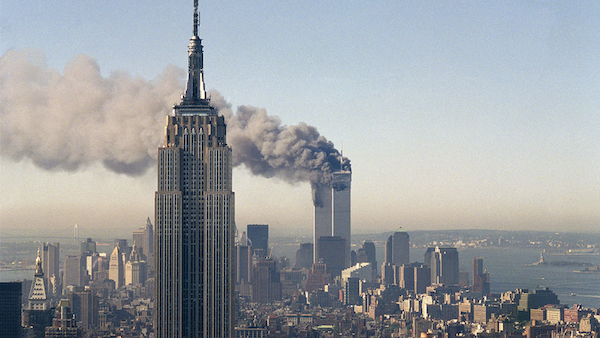
Later, at chapel, the scheduled order of service was scrapped. No one quite knew what to say or do, but we knew that the customary program would not do. We lit a candle, said some prayers; we may have sung a hymn. Then we left. Campus shut down. A lot of folks went straight home. Others decided to stay. I got my lunch out of the fridge and sat down in front of the TV to watch the latest reports filtering in. Much of the rest of the day is a blur of shock and disbelief. At some point, late in the afternoon, I drove home. That drive is one of the most indelible memories I have of 9-11. On the road in Atlanta, in what should have been the beginnings of rush hour, the street was practically deserted. It was like Christmas—but not.
The days following the attacks, nothing else was talked about as the scope and depth of the tragedy slowly came into focus. Dramatic and devastating images blanketed the news. And the nation rallied behind the suffering. I remember hearing incredible stories about men, women, and children reaching out to help their neighbors—and even complete strangers—who were stranded at airports or frantic about the fate of missing loved ones. It was a split screen view of the best in humanity paired with the worst of humanity set inside the same frame.
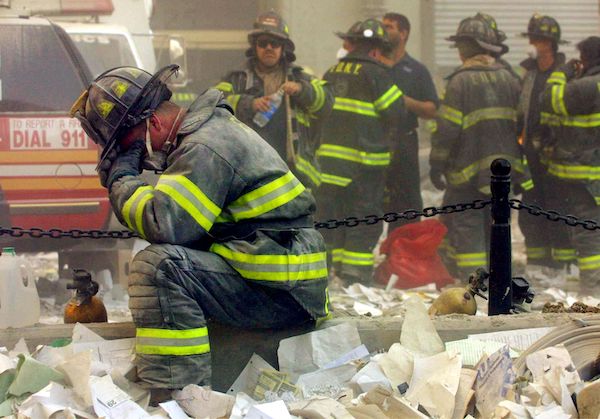
In the intervening years, there has been much fierce debate about the events of 9-11. We’ve gone to war to try to solve our problems and vent our fear and frustration. We have wrestled and continue to wrestle with a legion of lingering concerns and persistent questions. One of the questions that has grabbed me by the heel and refuses to let go is, in the aftermath of disasters such as the events of September 11th, what distinguishes (or should distinguish) a Christian response from a non-Christian response? How should the church behave differently from Mercy Corps or the Red Cross? Or should there be much of a difference? Many nationally known aid organizations that we think of as secular agencies were, in fact, founded by individuals with strong religious beliefs. Is the most faithful and practical thing to do, then, simply to partner with these organizations in doing their humanitarian work?
“In the aftermath of Disasters such as September 11th, what distinguishes (or should distinguish) a christian response from a non-christian response?”
On one level, the answer to this last question is most certainly, yes. We see Nehemiah doing much the same thing for Jerusalem that the Red Cross did for New York City. Nehemiah’s heart is grieved by the thought of his homeland, devastated and lying in ruins, and he asks the Persian king for a leave of absence so that he might rebuild the great Jewish capital. The scriptures say that the hand of God was upon him in this endeavor. The king grants his request, and Nehemiah goes to oversee the rebuilding of Jerusalem. In so doing, he gives the people of Jerusalem hope—and there is nothing ungodly about giving people hope. Thus, I have no doubt that the physical and material rebuilding of cities and lives is God’s work, and if we who claim to be Christ’s disciples do not take part in and contribute to that effort, there is a problem.
However, no matter how many touching and miraculous humanitarian stories I heard in days and weeks following 9-11 and said, “Yes—that is definitely what Jesus would do,” I couldn’t help thinking that there was something missing; that we Christians should do more; and if we don’t, there is a problem.
It has taken me awhile, but I think the “more” I’ve been looking for is to be found in the heart of this passage from Philippians chapter 2.
“(The Christian Response) should be an extension of the way we live out lives in the course of every day, not an exception we make in the wake of catastrophe.”
One of the ways in which a Christian response to tragedy should be different from a non-Christian response is that the Christian response should be typical and not extraordinary. What I mean by that is this: it should be an extension of the way we live our lives in the course of every day, not an exception we make in the wake of catastrophe. It shouldn’t take an act of war like 9-11 for us to have compassion on someone stranded in the airport. It shouldn’t take a natural disaster like Hurricane Katrina for us to want to rescue the poor and the infirm out of their perilous circumstance. Those should have been ongoing and active concerns on September 10, 2001 as much as on September 12, 2001, because Jesus calls us to faith as a way of life, not just as a special response to special circumstances.
That’s what Paul is trying to remind the church at Philippi about. He says they shouldn’t just have compassion and sympathy for one another, and live in full accord and of one mind in those exceptional moments when he is with them. They should live that way even when he is absent. In fact, they should live that way especially when he is absent. That’s what it means to work out your salvation in fear and trembling. It’s a reminder to make walking in our faith the daily focus of our lives; and it’s a reminder that we still need to hear.
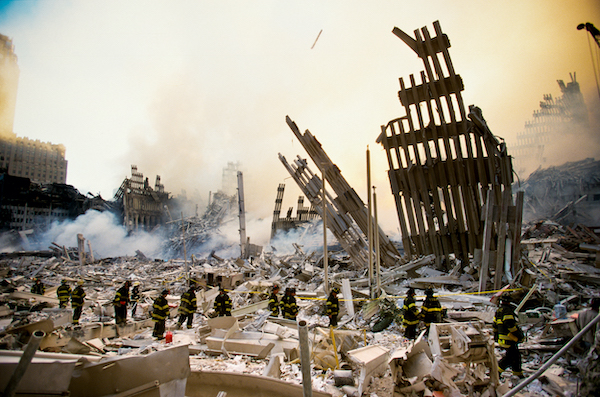
We should be mindful of Paul’s directives when we read the story of Nehemiah, too. Contrary to what our first impressions might be, this is not a story of emergency response in the same way 9-11 is a story of emergency response. The walls of Jerusalem had lain in ruins for years before Nehemiah took it upon himself to oversee their repair. The first Jews had returned from exile in Persia decades before Nehemiah himself made the journey. The conditions in Jerusalem had been created by a far distant tragedy; they were not the result of a recent or sudden crisis. Even though the Temple had been rebuilt, the inhabitants of the city had become accustomed to living in rubble. That’s all they knew. And perhaps because it was all they knew, they stopped seeing the ruins for what they were, and they lacked the will and the resources to correct the situation.
But Nehemiah saw. Nehemiah remembered what Jerusalem once was and realized what it could be again, what it should be again. He knew of his people’s plight and he was grieved. He empathized with them and acted on that empathy, even though the fate of Jerusalem didn’t affect him directly. He was Jewish, but he was living far away, serving in an honored position in the court of the most powerful king in the world. If Jerusalem remained in ruins, it would be no skin off his back. Yet, he was moved. He was moved by others’ misery and misfortune and he responded. And the hand of God was upon him.
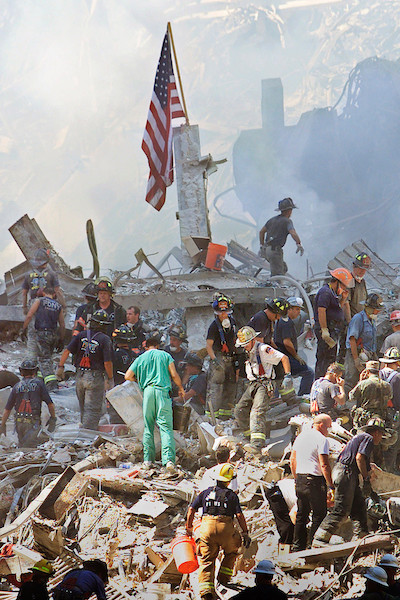
Thus, God’s call to His servants is more than a call to empathy and service in times of acute crisis. Anyone with even a sliver of conscience feels for the victims of terrorist attacks and natural disasters. Anyone with a heart, even a heart two sizes too small, would want to help those suffering from the effects of a 9-11 or a Hurricane Katrina. But God doesn’t call His servants to be just anyone. He calls them to be someone. He calls them to be someone who makes a difference regardless of where the news cameras are or are not rolling, regardless of where national attention is or is not focused.
He also calls His servants to do more than rebuild; He calls them to restructure. He calls them to help others recognize the spiritual, physical, and social rubble lying in their midst, and to be personally involved in cleaning it up. Nehemiah did more than rebuild the walls of Jerusalem. If you read the rest of the book, you’ll see that he helps to restructure and revamp the whole of Jewish society. That’s what it means to be a servant of God: it means giving of ourselves and of our abundance where we see need, instead of fending for ourselves and expecting others to do the same. It’s about a level of love and care for one another as human beings that goes beyond emergency assistance. It’s about being of the same mind, having the same love, and being in full accord with one another. If we did that as a people of faith, as a nation, perhaps we would not have experienced 9-11, and the cost of disasters like Katrina would not be nearly so high in human terms, because there wouldn’t be so many people in our country trapped in poverty and at the mercy of life’s storms.
“That’s what it means to be a servant of god: it means giving of ourselves and our abundance where we see need, instead of fending for ourselves and expecting others to do the same.”
Nehemiah reminds me of a story my mentor and friend, Dr. John Claypool, once told about two farmer brothers – a story that he himself heard from a Rabbi years ago. These two farmer brothers owned fields adjoining one another, and even though each held his own property, had his own home, and kept his own barn, they tended the land together. As the years went by, they did well. They were blessed with good soil and adequate rain, and with much hard work they reaped many good harvests. Their barns were full. Life was good.
The older brother had a wife and six children. The younger brother never married. One night, after a hard day’s work, the younger brother was sitting on the front porch of his house, resting and looking out on the world. Under the light of the full moon, he could see the silhouette of his brother’s house across the fields in the distance. And he began thinking. “You know, we’re getting older. There is going to come a time when we’re not going to be able to continue working this land the way we do now. We’re going to have to rely more and more on the stores we have saved up over the years. My brother has a wife and six children. That’s a lot of mouths to feed. And even though I know his barn is full like mine, I think he’s going to need more than I do when that time comes. But he’s a stubborn ol’ boy. I know he’d never accept anything if I offered it to him.”
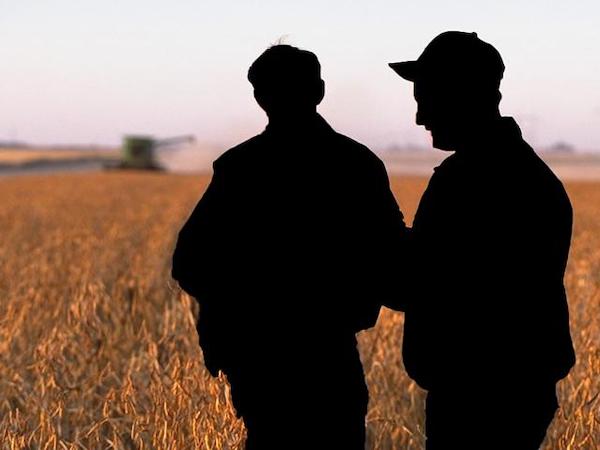
As it happened, that same night the older brother was also sitting out on his front porch, resting and enjoying the fresh night air. And he, too, looked out across the fields and saw the silhouette of his brother’s house off in the distance under the light of the full moon. And he began thinking, “You know, we’re getting older now. There is going to come a time when we’re not going to be able to continue working this land the way we did today. We’re going to have to rely more and more on the stores we’ve saved up over the years. My brother’s over there all by himself. When that time comes, I’ll have a wife and six loving children to take care of my needs. He doesn’t have anybody like that. He may have to take friends or relatives under his roof to look after him, and he’ll have to provide for them. I think he’s probably going to need more than I do to live out his life. But he’s a stubborn ol’ boy. I know he’d never accept anything if I offered it to him.” After pondering the situation for a few moments, he said. “I know what I’ll do. The next time there’s a full moon, I’ll back my wagon up to my barn and load it down with all the things I think he might need. Then I’ll sneak over to his barn, add them to his stores, and he’ll never know the difference.”
And that’s exactly what he did. When the full moon once again shone in the night sky, the older brother backed his wagon up to his barn in the wee hours of the morning and filled it with all the things he thought his brother might need. Then he slowly began making his way across the fields toward his brother’s barn. Suddenly, about half way there, he heard a noise. Something was coming toward him—and it sounded big. He stopped and held his breath. Then the crops parted and, lo and behold, out came his younger brother. He had his wagon with him, too, and it was loaded down with stores from his barn. The brothers stared at each in silence for a moment. Finally, the older brother asked, “Where are you going with all that stuff at this time of night?”
The younger brother replied, “I was about to ask you the same question.”
Not wanting to start an argument, the older brother decided he better confess. “Well,” he said, “a few weeks ago I was sitting on my porch resting after a hard day’s work. I got to thinking about the future and about how we’re both getting older. The time is going to come when we can no longer work these fields the way we can now. I saw your house across the way under light of the moon and started thinking about how you were over there all by yourself without anyone to take care of you as I have. I figured you might need a little more to live off of than I will. But I knew if I offered it to you, you wouldn’t accept it. So, I filled my wagon here with all the stuff I thought you might need and I was on my way to put it in your barn without you knowing it.”
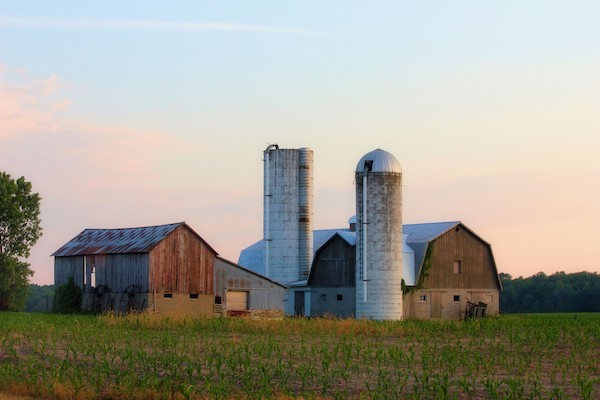
The younger brother stared at him in amazement.
The older brother said, “I’m sorry for trying to deceive you. I’ll take all this back home. Please forgive me if I have offended you.”
The younger brother said, “No, no—that’s alright. You see, I was on my way to do the same thing for you. I got to thinking that you have a wife and six children and that’s a lot of mouths to feed. I figured you were going to need more to live off of than I will need precisely because I only have myself to look after. But I knew you would never accept it if I offered it to you. So, I was going put all this stuff in your barn tonight without you knowing it.”
After a few moments of silence, the brothers embraced right there in the middle of the field. And the Rabbis say that even though the moon was shining and there wasn’t a cloud in sight, a few drops of rain fell from the sky, because God was weeping. He was weeping tears of joy because finally somebody got it. There is enough. There is enough for everyone. God did not drop us into this world without providing for us. There always has been enough and there always will be if we are mindful of one another and are willing to share and give generously of what we have.
That’s the good news of God’s love. The challenge for us is to live in such a way that everyone has access to the abundance of God’ good creation. Jesus called it loving thy neighbor as thyself. That’s the answer. The question is: do we get it?
May God give us all the grace and the courage to both give and receive generously. Amen.



















